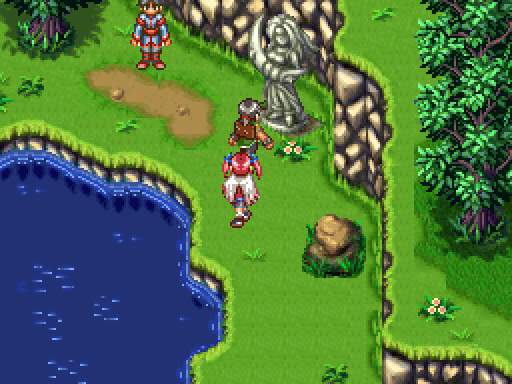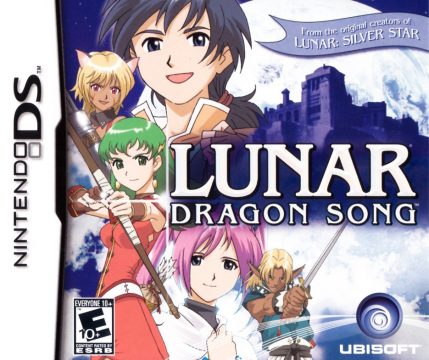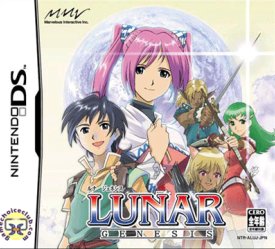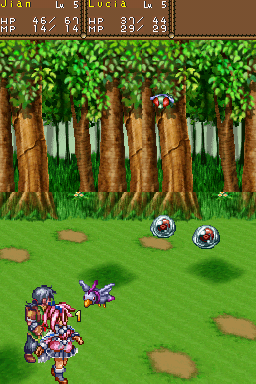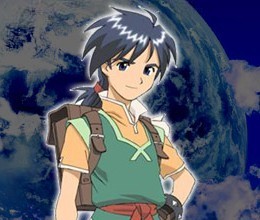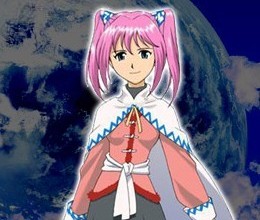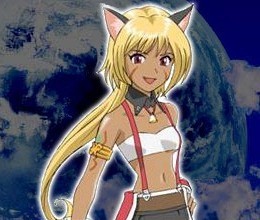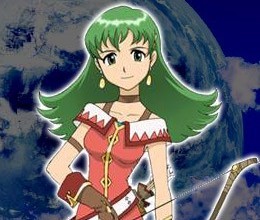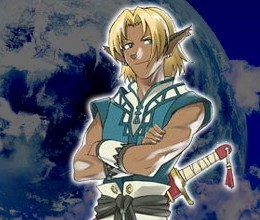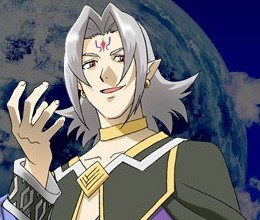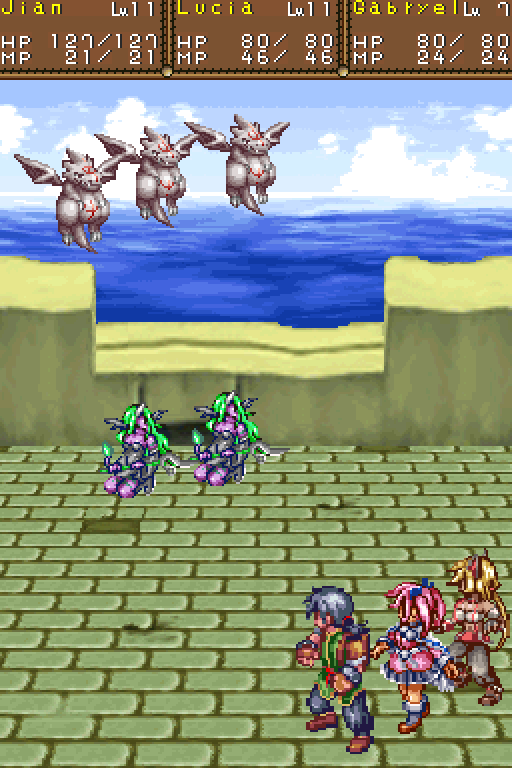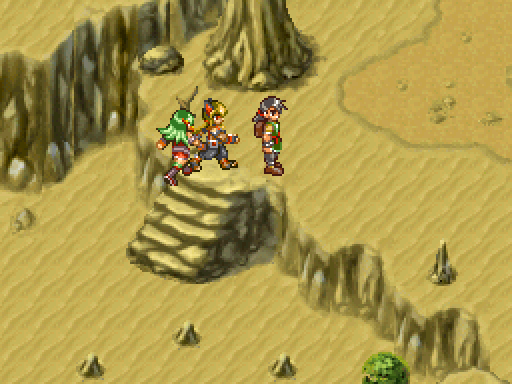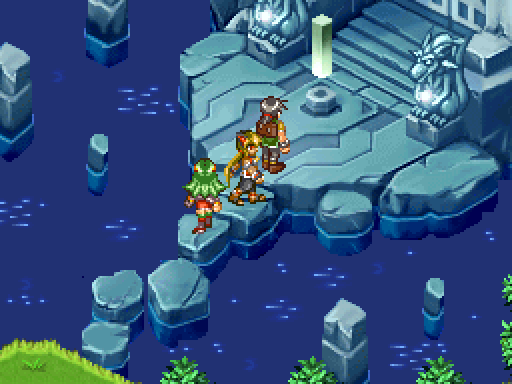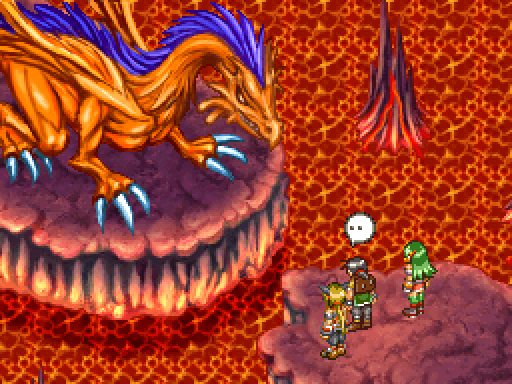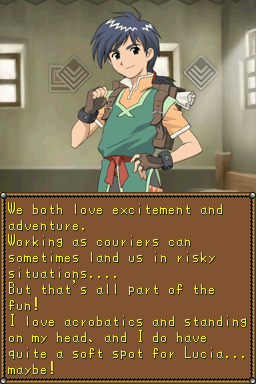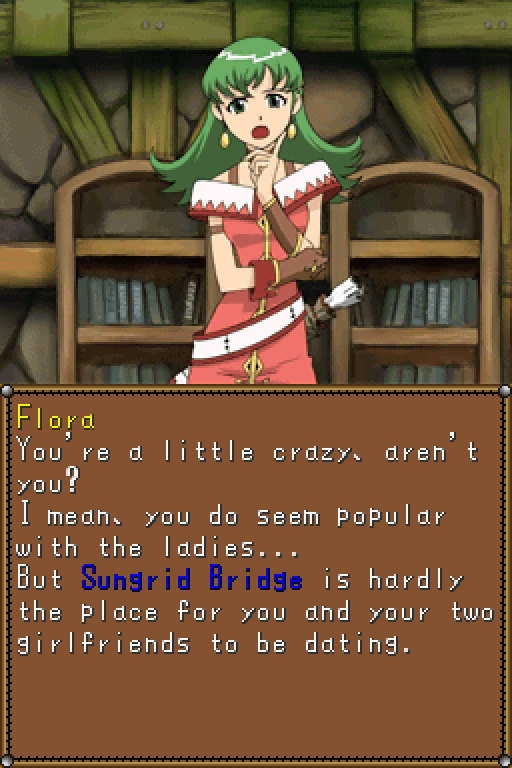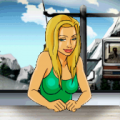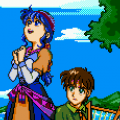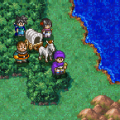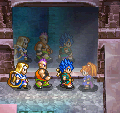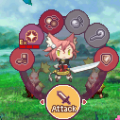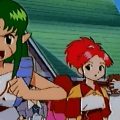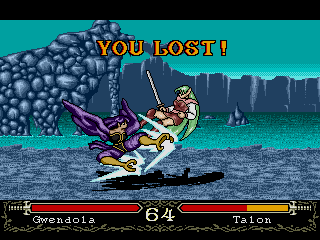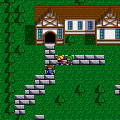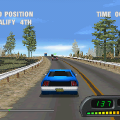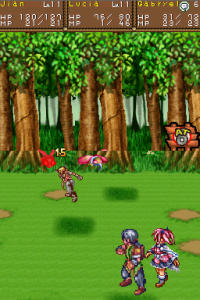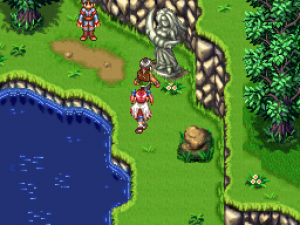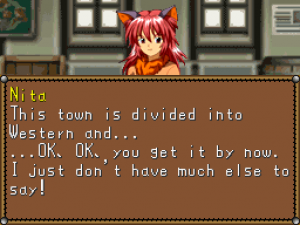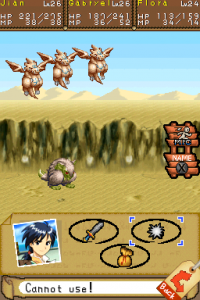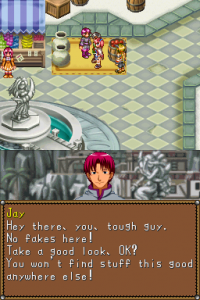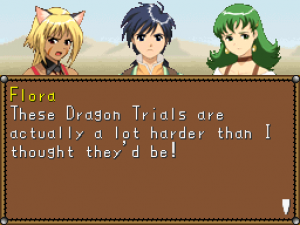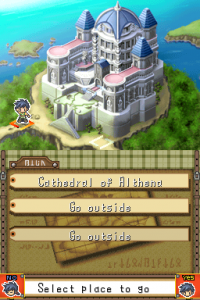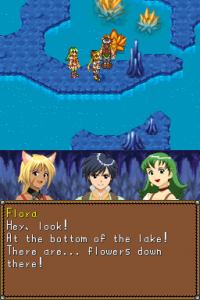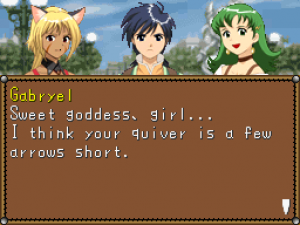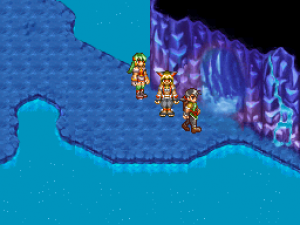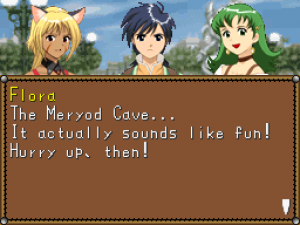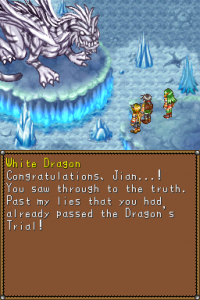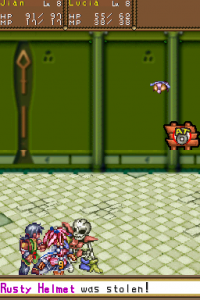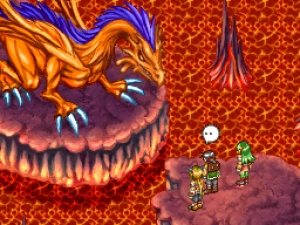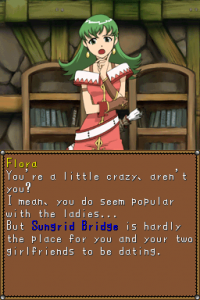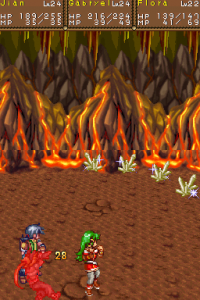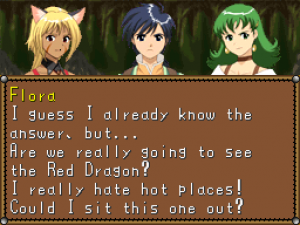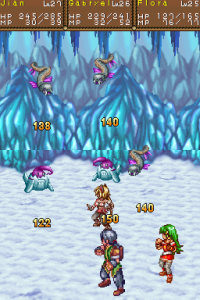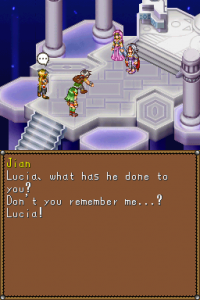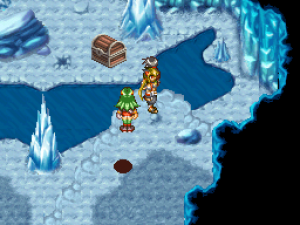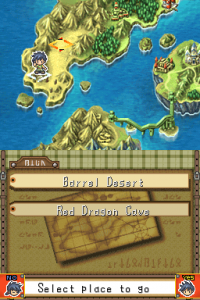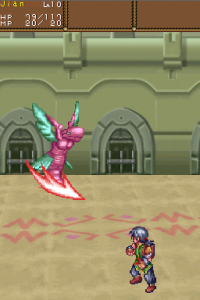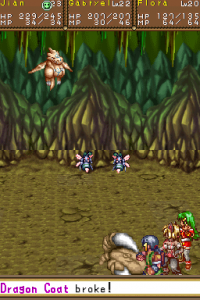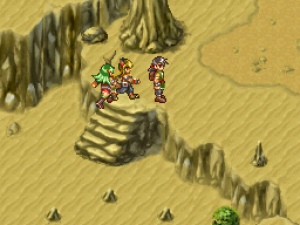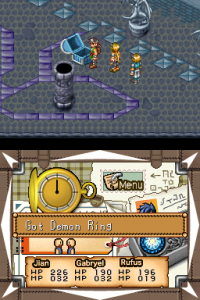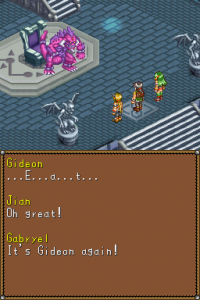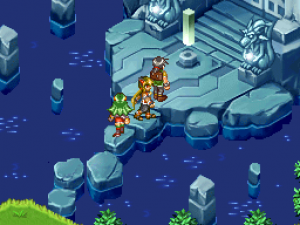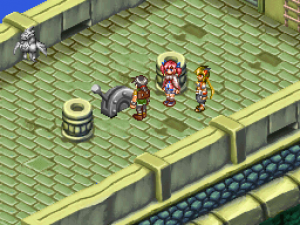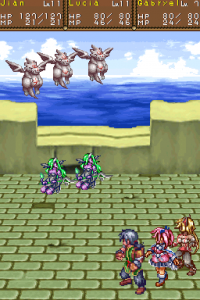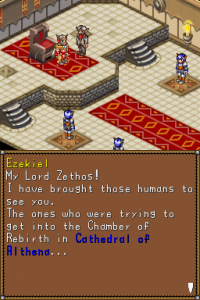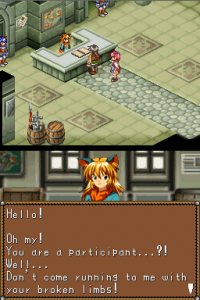- Lunar: The Silver Star
- Lunar: Eternal Blue
- Magical School Lunar
- Lunar: Dragon Song
For a number of years, between 1997 and 2003, the Lunar series was caught in legal limbo. The issues began with the Saturn port of Magical School Lunar which was delayed due to Studio Alex being unable to meet their deadlines, and Game Arts being forced to hire a subcontractor to finish it up. As retribution for the extra costs they incurred, they refused to pay Studio Alex any royalties for the subsequent versions of Lunar: Silver Star Story, arguing that they weren’t owed any since they didn’t really have anything to do with them. (Technically, they only worked on the original version, with Game Arts being in charge of all of the others.) This resulted in a legal quagmire that lasted until 2003, when Studio Alex went bankrupt due to the costs, resulting in Game Arts effectively winning. From here, they created two remakes of the original Lunar: one for the Game Boy Advance in 2004, and another for the PlayStation Portable in 2010. Between these, they also created a new Lunar title in 2005 for the then brand-new Nintendo DS, the fourth original game in the series.
The cover art for the American version brags that this game, Lunar: Dragon Song (note the initials) is from the developers of Lunar: The Silver Star. This is extremely misleading – while Game Arts was still involved, the game was primarily produced by a company called Japan Art Media, who had done the development work on Silver Star Story as well as Lunar Legend for the GBA, but had nothing to do with the original Sega CD game. Moreover, they were only the team that did the grunt work in developing the technical part of the game – the writers of the original story, Kazunari Tomi and the rest of Studio Alex, had absolutely no part in it. Which is just as well, since Dragon Song ended up being one of the worst JRPGs ever made.
After Lunar 2, fans were long expecting an actual third Lunar game, either something new or a game that told the story of the original Four Heroes. While no material was ever really made public, there were reports that an actual Lunar 3 had begun development, though with Studio Alex no longer in business and having lost the rights, it’s pretty clear that draft would never see the light of day. So Game Arts and Japan Art Media just went in a completely different direction with this one.
The game is actually a prequel to the rest of the games, taking place 1000 years before the original Lunar: The Silver Star (and roughly 500 years before Magical School). The focus is on a boy named Jian and his partner Lucia, who begin as mere package couriers and then get involved in something much bigger.
Characters
Jian Campbell
The hero, who works for Gad’s Delivery Service. He’s a wannabe acrobat and attacks with his feet.
Lucia Collins
Jian’s partner, who attacks with umbrellas and utilizes Althena’s magic, mostly as healing spells. She gets kidnapped fairly early on.
Gabryel Ryan
Known to friends as Gabi, she’s a beastgirl and daughter of the Beast King Zethos. She’s sort of like an analogue to Jessica in this way, but she’s skilled in physical attacks rather than healing spells. Note that “beastmen” in this game occasionally includes “catgirls”, instead of just the elf-like creatures seen in the other games.
Flora Banks
A member of the tribe that lives on the Frontier, who acts as a guide for the heroes and helps them rescue Lucia. She is primarily a healer and also wields a bow.
Rufus Clow
This beastman is a member of Zethos’ Strike Force, charged with taking down Ignatius and the Vile Tribe on the Frontier. He views Jian as a rival at first, but eventually they become pals.
Ignatius
The antagonist of the game, a Dragonmaster who betrayed Althena and now leads the Vile Tribe.
From a plot standpoint, it’s basically a simplified retread of Silver Star Story – anyone familiar with it (the target audience for this title, obviously) will spot the obvious plot beats, including Lucia being the human reincarnation of Althena (though curiously having nothing to do with Lucia from Eternal Blue, despite sharing the same name), as well as the second half of the game involving fighting the four dragons in order for the hero to become the Dragonmaster.
This is only the beginning of the game’s problems, which are filled with confounding issues. For starters, the standard walking speed on the map is incredibly slow. As with the Lunar remakes, enemies are visible on the field, so at least there aren’t any random encounters. You can run…but it drains health. This was probably done so you couldn’t just dash past enemies; in the 32-bit Lunar 2, you could only sporadically dash for this very reason. But this is a far worse alternative, and it has the side effect of forcing you to either waste healing items or just putter very slowly through dungeons. Also, if anyone in the party dips below 1/3rd health, you can’t run at all. You even lose health in the towns, when there’s no danger! To be fair, the HP drain isn’t proportional, so once you gain enough levels, it becomes less of a problem than it is in the beginning, but it’s still an annoyance and there’s no justification for it at all.
The battle scenes are also incredibly boring. You can’t pick your target, you just hit “fight” and then watch. There’s barely any difference between the “manual” and “auto” functions. According to interviews this was done to speed up battles…in which case, why is the game always stopping to rotate the camera “dramatically” as we watch an enemy slowly shuffle across the field to attack then slowly shuffle back into its place? To be fair, you can speed up the animations by holding the trigger buttons, but if you’re essentially required to do this all of the time unless you want standard fights to last a few minutes, why wasn’t that the default speed?
Furthermore, there are two “modes” which let you determine your spoils after combat: “Virtue” and “Combat”. In Virtue mode, you get experience (called “Althena Conduct” here) but nothing else; in Combat mode, you get items, which can be sold for cash, or you randomly get monster cards, which act as special abilities. The question is: why divide this up? Why not give both items/gold/experience at once, like 95% of the other JRPGs out there? It is a question without a good answer. But it’s yet another aspect which seems intentionally designed to make your Lunar: Dragon Song experience as tedious as possible.
Along with this comes some interesting ideas: if you kill all of the enemies in an area, then they’ll stay dead, plus you get a small HP/MP restoration and access to a special treasure chest in the area. However, after every battle, a timer restarts, and if you don’t encounter another enemy before then, then another enemy respawns. Coupled with the HP drain when running, this potentially creates another problem, as you crawl over maps to find those stragglers before an enemy pops up and sets back your progress. Luckily most of the maps are so small that this is rarely an issue.
The monster card system is also unique, if not particularly well thought out – you can carry multiple cards, but only one card of a particular enemy. Each card has a limited number of uses, and it breaks once you use it too much; the only way to replenish it is to track down the enemy and fight them over and over until it drops. Frustratingly, bosses have unique cards too, but since their drops are still random and they’re just one-off encounters, it’s possible to permanently miss them.
It’s just as well since the monster cards aren’t really useful enough to be worth the hassle, as combat is simple enough that you can generally just out-level your opponents. Technically the enemies scale up with you as in Silver Star Story, but there are either level caps or they don’t increase proportionally. Since this means you can still grind past them, it leaves the question of why it’s even implemented to begin with.
All of those items you get from Combat mode have a secondary purpose too. Since the main characters are technically couriers, there are optional subquests you can partake to deliver certain items to various places in the game world. Calling them “couriers” is somewhat inaccurate though, since it suggests just taking a package from one place to another. Here, it’s more like a standard RPG system, where you actually need to collect the requested items yourself (or buy them) and then hand them off. You can game the system by undertaking certain jobs and doing them over and over, but taken altogether, it just feels like another subsystem to add tedium to an already remarkably repetitive game.
All of these problems total up to create an incredibly sluggish, remarkably unfun experience. But, for comparison’s sake, look back to Magical School Lunar on the Saturn. It too had tremendous pacing problems (though it was due to constant random encounters rather than numerous poorly-balanced systems), but at its core, at least it looked, felt, and sounded like a Lunar game. Lunar Dragon Song doesn’t even come close to reaching that bar.
Seeing as the game is a prequel, taking place 1000 years before any of the others, it’s completely divorced from any of the characters that Lunar fans knew and loved, in some places even contradicting canon. Lunar 2 also took place a century after the original, but it also took care to add links between the two games – Lunar DS barely does this. Early designs at least included the presence of the floating city of Vane, but it is nowhere to be found in the completed version. Some location names will be familiar, and the enemies are part of the Vile Tribe, but those references are skin-deep. The only thing it really adds to Lunar lore are the racial tensions between the Beastmen (dumb but strong, and living in cities) and Humans (smart but weak, and concentrated in rural areas), which weren’t really a part of the other Lunar games. However, the game isn’t written smartly enough to deal with its intricacies, and doesn’t really say much more than “racism is bad”. It can’t even get the climax right – you only fight Ignatius, the main antagonist, once, halfway through the game, in an unwinnable battle. The actual final battle is against his underling Gideon, after which Ignatius proceeds to fall off a cliff.
The English translation is sterile and boring, a particular offense considering that the original games were known for their lively localizations. Say what you will about Working Designs’ occasionally inappropriate humor, but their writing was incredibly lively and largely what defined the series for English speaking gamers; Dragon Song was localized by Ubisoft, who only put in the very basics of translation work. (The earlier Lunar Legend was also localized by Ubisoft and suffered the same problem). Lucia has a somewhat tsundere relationship with Jian, and various female NPCs have a tendency to strongly flirt with the hero, but they come off as weirdly robotic instead of goofily charming.
Moreover, the series was defined by its anime cutscenes, along with plenty of voice acting and some vocal songs. There’s none of that here. The game doesn’t even look visually reminiscent, seeing as the super-deformed characters are replaced by more realistically-proportioned sprites. (The PSP remake of Lunar went the same route, but at least they kept the same visual style, whereas this could be any generic RPG.) The character designer, Toshiyuki Kubooka, returns from the old days, but he was clearly having an off day when he designed these incredibly bland heroes. Lucia even looks like a recycled character design from one of the tertiary characters from Magical School Lunar!
The list goes on. During battle, your characters mostly stay in the foreground, but they’re drawn at a lower resolution, causing them to be scaled unevenly and pixelated. Towns were apparently too difficult to design, so they’ve been reduced to a single map screen in which you move around with a cursor. The music is, relatively speaking, probably the strongest part of the game, because it’s not really awful, but it’s still mostly forgettable. Series composer mainstay Noriyuki Iwadare is nowhere to be found.
There are probably JRPGs that are slightly worse than Lunar: Dragon Song. But you pretty much know what you’re getting into when you expose yourself to some tripe by Idea Factory or Compile Heart; complaining about those is like eating garbage then giving the local dump a single star review on Yelp. This is far more cynical, a terrible game wrapped in the guise of a fan favorite series, fooling unwary gamers into thinking that maybe, deep within its surface, lies some remnant of the Lunar games from ages past. There doesn’t.
While the development problems of Magical School became public, there was never anything quite as illuminating to figure out why Dragon Song ended up the way it did. It wasn’t the first RPG on the DS, but it was released in the early days of the system, and it was the first with some name value that was released in English. Perhaps, again, that rush caused all of these wildly unbalanced subsystems to be implemented, in order to lengthen playing time, since the game really isn’t that long otherwise. The backlash was immediate though, with mediocre reviews from journalists to absolutely scathing condemnations from Lunar fans. There hasn’t been a Lunar game since, but it’s clear that without the right people behind it, it’s probably for the better.
Links:
Lunar Dragon Song Let’s Play – Some pics from here.
